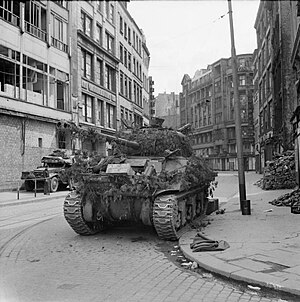| Capture of Hamburg | |||||||||
|---|---|---|---|---|---|---|---|---|---|
| Part of the Western Allied invasion of Germany in the Western Front of the European theatre of World War II | |||||||||
 A British Sherman Firefly tank in the city centre after the battle. | |||||||||
| |||||||||
| Belligerents | |||||||||
|
| |||||||||
| Commanders and leaders | |||||||||
|
Miles Dempsey Evelyn Barker Lewis Lyne |
Kurt Student Alwin Wolz (POW) | ||||||||
| Units involved | |||||||||
|
VIII Corps (7th Armoured Division) XII Corps (elements) | 1st Parachute Army (elements) | ||||||||
| Strength | |||||||||
| 3 divisions | 2 divisions (understrength) (~3,000 troops) | ||||||||
The Capture of Hamburg was one of the last battles of the Second World War, where the remaining troops of the German 1st Parachute Army fought the British XII Corps in Lower Saxony for the control of Hamburg, Germany, between 18 April and 3 May 1945. British troops were met with fierce resistance when they advanced toward the city as Hamburg was the last remaining pocket of resistance in the north. Once the British had captured the city, they continued their advance north-east and sealed off the remnants of the 1st Parachute Army and Army Group Northwest in the Jutland peninsula.